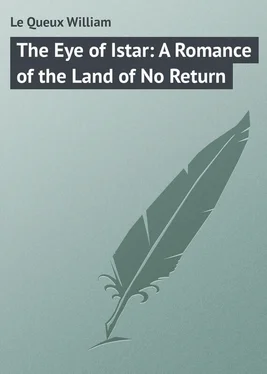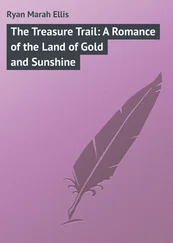William Le Queux - The Eye of Istar - A Romance of the Land of No Return
Здесь есть возможность читать онлайн «William Le Queux - The Eye of Istar - A Romance of the Land of No Return» — ознакомительный отрывок электронной книги совершенно бесплатно, а после прочтения отрывка купить полную версию. В некоторых случаях можно слушать аудио, скачать через торрент в формате fb2 и присутствует краткое содержание. Жанр: Прочие приключения, foreign_prose, на английском языке. Описание произведения, (предисловие) а так же отзывы посетителей доступны на портале библиотеки ЛибКат.
- Название:The Eye of Istar: A Romance of the Land of No Return
- Автор:
- Жанр:
- Год:неизвестен
- ISBN:нет данных
- Рейтинг книги:5 / 5. Голосов: 1
-
Избранное:Добавить в избранное
- Отзывы:
-
Ваша оценка:
- 100
- 1
- 2
- 3
- 4
- 5
The Eye of Istar: A Romance of the Land of No Return: краткое содержание, описание и аннотация
Предлагаем к чтению аннотацию, описание, краткое содержание или предисловие (зависит от того, что написал сам автор книги «The Eye of Istar: A Romance of the Land of No Return»). Если вы не нашли необходимую информацию о книге — напишите в комментариях, мы постараемся отыскать её.
The Eye of Istar: A Romance of the Land of No Return — читать онлайн ознакомительный отрывок
Ниже представлен текст книги, разбитый по страницам. Система сохранения места последней прочитанной страницы, позволяет с удобством читать онлайн бесплатно книгу «The Eye of Istar: A Romance of the Land of No Return», без необходимости каждый раз заново искать на чём Вы остановились. Поставьте закладку, и сможете в любой момент перейти на страницу, на которой закончили чтение.
Интервал:
Закладка:
The towers, cupolas and high white walls of the great, impregnable palace, wherein dwelt the woman who had enchanted me, stood dark and frowning against the crimson brilliance of the afterglow, and from my exalted position on the back of my meheri I turned once to glance at them, wondering if Azala knew of my expulsion. Perhaps from her lattice in the great square tower rising above the city she was watching my departure, but she had given no sign, and sorrowfully I at length turned my back upon the White City of the Sultan ’Othman, and urged my camel onward towards the horizon, which seemed a sea of mirage, with a feeling that Fate had, indeed, laid her hand upon me with undeserved harshness.
In the cooler hours that succeeded, when the light had entirely faded, and the wind, whirling up clouds of find sand into our faces, compelled us to cover them as we rode on, leaving only our eyes visible, Shu’ba, the chief of the black horsemen accompanying me, declared that if we were to reach Kukawa, in Bornu, within three days, we should be compelled to press forward constantly, resting but a few hours during the heat of noon. My guards were heavily armed, each carrying a very keen, straight sword, a dagger suspended from the left wrist, and a spear six feet long, while with several this arsenal was also supplemented by a rifle. Acting no doubt under the Sultan’s orders, they treated me with every consideration, and proved themselves light-hearted, genial fellows; yet the long ride through the great, silent wilderness, eternally warm, eternally gloomy, gave me many opportunities for dismal reflections upon the strange turn events had taken. Azala had fascinated, entranced me, and I loved her with all the strength of my being. Yet I had been thus forcibly torn from her, never to return on penalty of death. Each long stride of the animal beneath me took me further from her, yet she trusted in me to save her. From the words uttered by Khazneh in reply to the Sultan, it was evident that the latter had had no knowledge of my capture and imprisonment, and Azala had, on account of her father’s absence, been unable to secure my release.
The mysterious symbol that seemed to link me in some inexplicable manner to the woman I loved had apparently produced in the Sultan a feeling of dismay, for when he noticed it a sudden terror had enthralled him. Awe-stricken at its significance, he had instantly rescinded the order for my execution, sending me forth from his empire as if apprehensive that my presence was a harbinger of some dreaded evil.
For a brief space we halted in the date-grove of Maifoura at midnight, eating a little tiggra with curdled milk diluted with water, and some ngaji or paste of sorghum, and having thus recruited our strength the cry of “ Ala e’dhahar! ala e dhahar !” (Mount! mount!) sounded, and we resumed our ride over the low hills of Kobiri, and through the great, gloomy forest of Gounel. South of the Lake Tsad the country is fertile, and only here and there are there wide, sandy deserts reminding one of the waterless, sterile regions of Azawagh and Taganet in the Great Sahara, that arid, monotonous, and almost impassable gulf that separates the regions of Sokoto, Bornu, Baguirmi and Gando from the European civilisation of Northern Algeria. Having passed through the forest, the wooded level became interrupted from time to time by bare-naked concavities, or shallow hollows, consisting of black, sedimentary soil, where, during the rainy season, the water collects, and drying up gradually leaves a most fertile sediment for the cultivation of the masakwa , a kind of holcus which is the most important article in the agriculture of Sokoto. We saw herds of ostriches, troops of gazelles and many moufflons as, on our forced march, we passed the great ruins of Thaba, grim, grey, time-worn monuments of the Roman occupation, forded the Yoobe river at Ngouroutoua – where my guards told me an English traveller named Richardson had died many years ago – skirted the lagoon of Mouggobi, and continuing for nearly eight hours along narrow, verdant valleys, where, side by side with the diminutive, stunted palms, grew the colossal baobabs, the mastodons of the vegetable kingdom, whose gigantic branches were inhabited by vultures, serpents, bats and lizards. Then at last we passed out upon the great granite plateau of Koyam, dotted over with hillocks and in part strewn with quartz sand, home of the nomad Uled-Delim, “pirates of the desert,” a sun-baked, stony wilderness devoid of any living thing. The third day was occupied wholly in crossing this vast solitude, where incessantly we were compelled to shout “ Hai ! Hai !” the ejaculation of caution to our camels, as the beasts, weary and jaded, plodded on until, about an hour after we had knelt to repeat our majhrib , while the shadows were lengthening as the sun declined, the tall, white watch-tower at the principal gate of Kukawa rose before us, and beyond lay the waters of Lake Tsad shimmering like liquid gold in the glorious evening light.
When the cry was raised that the town was in sight, my guards held consultation and halted. Then Shu’ba, drawing up his camel close to mine, exclaimed, —
“Thou hast performed the journey within the time stipulated by our lord the Sultan, therefore we now leave thee to continue thy way alone.”
“Wilt thou not rest yonder for a while before returning?” I asked, surprised.
“Nay,” he answered, shrugging his shoulders significantly. “The people of Bornu are our enemies. We would rather take our ease upon the plains than within the city of those who seek our overthrow” – a speech that was greeted by low, guttural sounds of approbation by the others perched on their camels around. Then, continuing, he said, “It is our Sultan’s will that the meheri thou ridest shall be given unto thee, together with this rifle, ammunition and jambiyah ,” and as he uttered these words he handed me the gun he carried, together with his pouch and a crooked knife in a silver scabbard he drew from his sash.
“Alone in these regions thou mayest require them,” observed a light-hearted young negro, with a broad grin.
“Unto thy Sultan, whose dignity be increased, render thanks in my name. Tell him that Zafar-Ben-A’Ziz is his grateful servant, and that he beareth neither malice nor hatred,” I answered.
“Behold, I am also charged with a further duty,” said Shu’ba, with a solemnity quite unusual to him. “Before we left the Fada one of the eunuchs of the Courts of Enchantment gave this unto me to deliver into thine hands,” and he drew from the breast of his gandoura a small box of delicately-chased gold, securely sealed.
“Whence didst thou obtain it?” I asked, in surprise, taking it in my hands.
“From Hisham, the eunuch. He refused to tell who had given it unto him, but gave me strict command to place it in thine hands at the moment when we parted, with an injunction that it must not be opened until thou art actually within the walls of Kukawa.”
“May I not investigate its contents now?” I asked, puzzled.
“Nay, curb thine impatience. Behold, the sun is already declining,” he answered, glancing around. “Spur onward, or, of a verity, thou wilt not obtain entrance to yonder city ere its gate is closed.”
His prompting influenced me to make hurried adieu, and, as with one accord they gave me “Peace,” I sped away in the direction of the town, turning once to wave back a farewell. As I rode forward, four armed horsemen, their white burnouses flying in the wind, sped across the plain to meet me. With rifles held high in air with threatening gesture, they in a few minutes pulled their horses to their haunches before me, loudly demanding whence I came.
Читать дальшеИнтервал:
Закладка:
Похожие книги на «The Eye of Istar: A Romance of the Land of No Return»
Представляем Вашему вниманию похожие книги на «The Eye of Istar: A Romance of the Land of No Return» списком для выбора. Мы отобрали схожую по названию и смыслу литературу в надежде предоставить читателям больше вариантов отыскать новые, интересные, ещё непрочитанные произведения.
Обсуждение, отзывы о книге «The Eye of Istar: A Romance of the Land of No Return» и просто собственные мнения читателей. Оставьте ваши комментарии, напишите, что Вы думаете о произведении, его смысле или главных героях. Укажите что конкретно понравилось, а что нет, и почему Вы так считаете.












